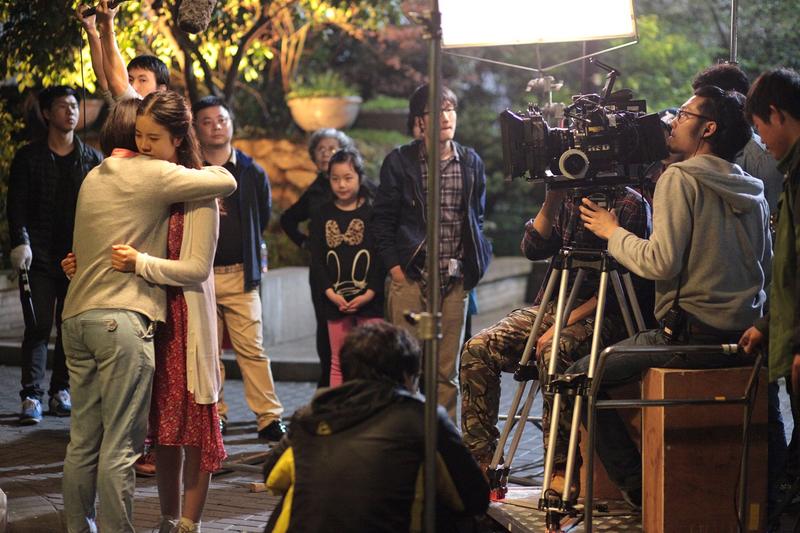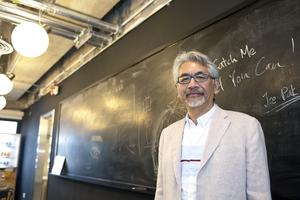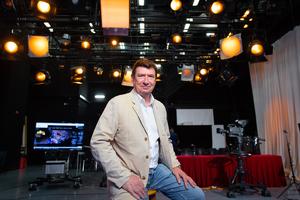 Students of HKBU’s acting program shoot an emotional scene for their movie. (PHOTO PROVIDED TO CHINA DAILY)
Students of HKBU’s acting program shoot an emotional scene for their movie. (PHOTO PROVIDED TO CHINA DAILY)
Globalization has become an imitable trend in business. The film industry being no exception, with co-productions among different cultures gaining ground and going international.
Hong Kong Baptist University’s Academy of Film has started a new program, Acting for Global Screen. An interdisciplinary “state-of-the-art” Bachelor of Fine Arts program in acting, it combines acting training and performance studies, technology understanding and contemporary cultural reflection in its curriculum.
As the world grows more digitalized amid the pandemic, acting has moved from the stage to the screen and from physical space to virtual setting
Man Shu-sum, endowed professor of film and television at HKBU, and Dr Hung Yeung Pong-wah, associate director of the university’s Academy of Film, are upbeat about the program’s prospects.
“We aim to connect the industry with global film talents,” says Man. “We welcome young film talents to come to Hong Kong and walk them through the wonderful four-year journey of film exploration and creation.”
The academy is motivated by the Global University Film Awards, which began in 2018 with a view to recognizing film productions by university students worldwide. This November marks the GUFA’s second edition, having attracted participants from more than 100 countries and regions so far.
ALSO READ: The silver screen shines again
The movie industry recognizes that “your market is not solely Hong Kong, but the world”, Man adds. “To attain a broad reach, we must be forward thinking.”
Learning amid COVID-19
The academy auditioned 44 among a flurry of applicants for the program. Sixteen of them got through, including 10 from Hong Kong, two from the United Kingdom, one from the Chinese mainland and one from India, according to Program Director Michael Bray. The selection process was rigorous as the course is designed for a small cohort who can work very closely and intensively to obtain the desired experience, says Bray. “So, it’s a good spread of different cultures”.
This school term, however, wasn’t smooth due to the disruption caused by COVID-19. But the school, against the odds, managed to get the new program up and running with both online lectures and offline training courses. “We’ve large studios, allowing us to split the students into groups to maintain distancing,” says Bray.
 Man Shu-sum, associate director of the Academy of Film at Hong Kong Baptist University. (PHOTO PROVIDED TO CHINA DAILY)
Man Shu-sum, associate director of the Academy of Film at Hong Kong Baptist University. (PHOTO PROVIDED TO CHINA DAILY)
The program focuses on acting, with stage acting and screen acting as the major courses. Taking a holistic approach in teaching and studying, the course incorporates an understanding of film directing, screen writing and play writing, substructure, the physicality of stage and performance, as well as Chinese and English language, and cultural studies. “These courses make up for the student’s artistic hinterland,” says Bray. “The thrust of my teaching is ‘actors are artists’. They learn by doing, through trials and errors, until they succeed.”
Acting for the global screen is complicated, notes Bray. It means that “acting, at heart, is as simple as living truthfully in imaginary circumstances”. This is actually a tried and true acting mantra and technique developed in the 1940s, which offers the teaching methodology and curriculum design for the new program.
Imagination is key to actors. Bray stresses. “It’s the ability to fully reinforce the imagination and live in the imagination. We all have imagination, but few can bring it to life as the educational system has this inherent ability strangled,” reckons Bray. So, all the courses must help students relearn the skill. They also need to be trained in physical control, movement, dance, mime and mask work, and be flexible and agile vocally to be able to perform both on stage and screen.
As the world grows more digitalized amid the pandemic, acting has moved from the stage to the screen and from physical space to virtual setting. Acting has to adapt to the predominance of screen entertainment.
Bray says a relevant part of the program is to teach students how to be a good story narrator, starting with them telling their own stories. Everyone has plenty of stories to tell, all of which could be extrapolated into a film, a TV series, an episode or a theatrical show. “What we’re aiming to do is to allow that process to take place.”
Acting is at the heart of the Acting for Global Screen program, but it’s by no means the only subject to teach. Graduates are expected to acquire a full set of skills, including script writing, directing and stage production. In their graduation projects, students will be actively involved in the whole process of film production. It’s a collaborative initiative within the Academy of Film.
 Michael Bray, program director of the Bachelor of Fine Arts in Acting for Global Screen at HKBU. (PHOTO PROVIDED TO CHINA DAILY)
Michael Bray, program director of the Bachelor of Fine Arts in Acting for Global Screen at HKBU. (PHOTO PROVIDED TO CHINA DAILY)
Stage versus screen
Stage and screen acting are different, stresses Bray. On stage, the acting is linear and organic. “You all go into a room with a director and a script, and work together privately in that room for a period of time. The director will investigate the texts – there’ll be improvisations and theater games. The actors will see each other’s character evolving and developing, and study the subtext and shape of the script,” Bray explains. More importantly, they’ll receive constant creative feedbacks from the director and other performers. It will turn out to be rewarding process, with the actors very alive to what’s going on. Finally, the stage performance will be shared with the audience, and that’s when the actors reimagine the play with the audience together, he says. Instant feedbacks shine through the stage acting, which makes for the organic nature of the theater.
Screen acting is non-linear and non-organic. Normally, the scenes are not shot in due sequence or in line with the plot development, which would take extra effort by the actors to immerse themselves into the roles they’re playing. “We give equal measure to both in the early part of the program, but towards the end of the course, we move to more screen outputs,” says Bray.
Acting for the colossal “global screen” entails a global vision that the academy strives to cultivate in students. “We introduce works and resources from around the world to our students, which inform their international mindsets,” says Bray. “Also, it may sound contradictory but very important that you must understand you’ve got something to give to the world from your culture, that you’re very important for the international storytelling. We’re trying to enable students to go over the mountains, presenting something not only for the audience here, but for people elsewhere, whether in Russia, France or Poland. You’ve to know the reach is always international.”
The academy has garnered a string of accolades in the past few years, showing it has been on the right track in education and spearheading the whole industry to produce film talents.
Among those in the hall of fame is Felix Chong Man-keung, whose Infernal Affairs trilogy scooped the “Best Screenplay” award at the Hong Kong Film Awards, while his directorial debut Once A Gangster earned him the “Best New Director” award. Hollywood director Martin Scorsese bought the copyright of Infernal Affairs and remade it, entitling The Departed. “It’s rare to see the Hollywood big boys buying copyright of Asian films,” says Man. Overheard and Project Gutenberg, both blockbusters, are his fame to claim.
READ MORE: Mounting a silver-screen comeback
Poon hang-sang, the distinguished cinematographer well known for his works Ip Man 2, Crossing Hennessy, Red Dust and The Island, also graduated from HKBU in 1976. “He’s the only one representing Hong Kong as an Oscar’s jury for cinematography,” notes Man.
Bray shrugs off parents’ apprehension about an actor’s future as “unnecessary”. “Acting will never be obsolete,” he emphasizes. The hardest thing to teach is screenwriting, but it’s an essential know-how for an actor. “How does an actor find a job? He must be able to distinguish a good screenplay from the bad. That requires the artistry of screenwriting and script reading, which is imparted in courses.”


